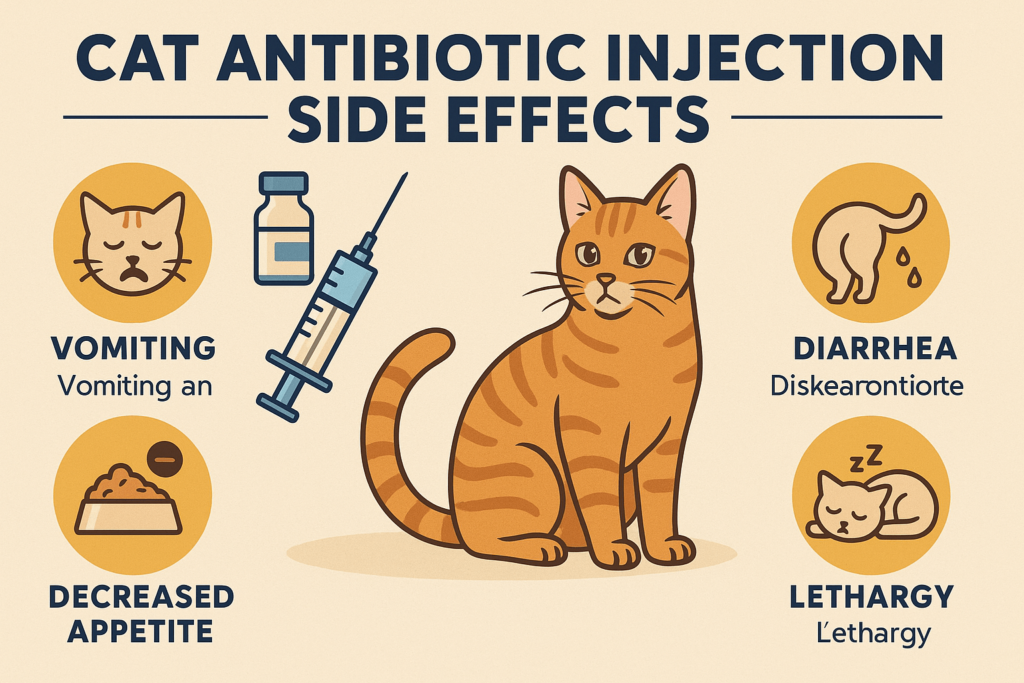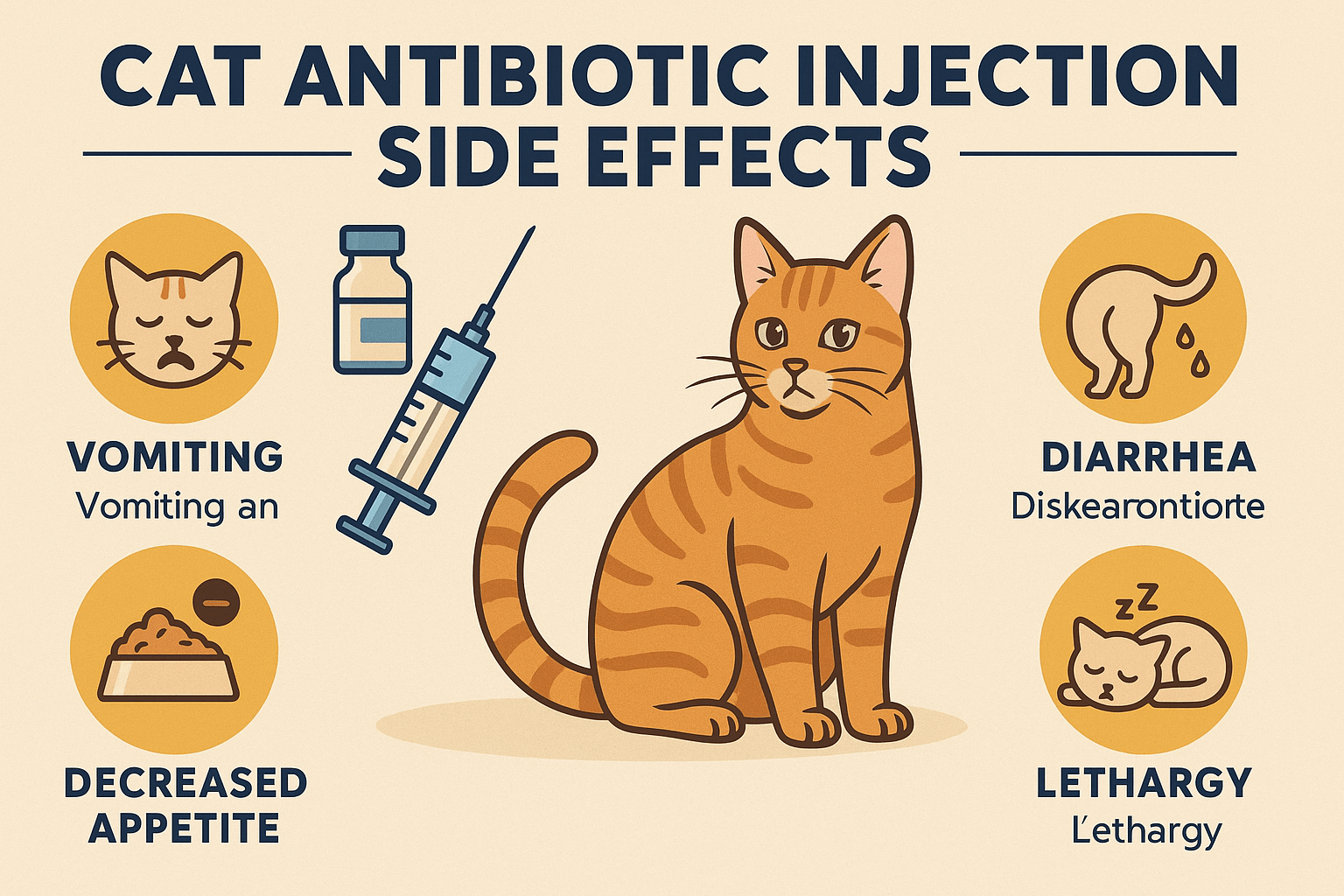Cat Antibiotic Injection Side Effects: What You Need to Know
Antibiotics are a vital tool in treating bacterial infections in cats, and injections are often used when oral medications aren’t feasible or effective. While these treatments can save lives, they may also come with potential side effects that cat owners should be aware of. Understanding the risks and benefits of antibiotic injections helps ensure your feline friend receives the best possible care. In this guide, we’ll explore common side effects, how to identify them, and what steps you can take to manage your cat’s health during and after treatment.
Common Side Effects of Cat Antibiotic Injections
While antibiotic injections are generally safe, some cats may experience mild to moderate side effects. Recognizing these symptoms early allows you to address any concerns promptly.
Injection Site Reactions:
Swelling, redness, or tenderness at the injection site is common but usually resolves within a few days.Gastrointestinal Upset:
Nausea, vomiting, or diarrhea may occur as the antibiotic affects the balance of gut bacteria.Lethargy or Weakness:
Some cats may appear more tired than usual or less interested in their surroundings after receiving an antibiotic injection.Allergic Reactions:
Rarely, cats may develop hives, itching, or facial swelling due to an allergic response to the medication.Loss of Appetite:
A temporary decrease in appetite is not uncommon, but prolonged refusal to eat should be reported to a vet.
Most side effects are mild and resolve on their own, but monitoring your cat closely ensures any serious issues are addressed quickly.

Serious Side Effects to Watch For
While rare, some antibiotic injections can cause severe side effects that require immediate veterinary attention. Being vigilant about your cat’s behavior and health is crucial.
Severe Allergic Reactions (Anaphylaxis):
Symptoms include difficulty breathing, collapse, or rapid swelling. This is a medical emergency requiring immediate care.Kidney or Liver Damage:
Prolonged use of certain antibiotics can strain these organs, leading to signs like increased thirst, frequent urination, or jaundice.Blood Disorders:
Rare cases may involve changes in blood cell counts, resulting in pale gums, bruising, or unusual bleeding.Neurological Symptoms:
Tremors, seizures, or disorientation may indicate a severe reaction to the antibiotic.Persistent Vomiting or Diarrhea:
These symptoms can lead to dehydration and malnutrition if left untreated.
If you notice any of these serious side effects, contact your veterinarian immediately to prevent further complications.
Check this guide 👉Cat Antibiotics for Abscess: Best 7 Expert Tips!
Check this guide 👉Cat Antibiotics Without Veterinary Guidance: Best 7 Tips!
Check this guide 👉How Long Can a Cat Stay on Antibiotics? Best 7 Tips!
Mild Side Effects | Serious Side Effects |
|---|---|
Swelling at injection site | Difficulty breathing or collapse |
Mild lethargy | Signs of kidney or liver damage |
Temporary loss of appetite | Unusual bleeding or bruising |
Gastrointestinal upset (vomiting) | Seizures or neurological symptoms |
Itching or mild skin irritation | Persistent diarrhea or dehydration |
How to Minimize Side Effects of Antibiotic Injections
Taking proactive steps can help reduce the likelihood or severity of side effects from antibiotic injections. These strategies ensure your cat remains comfortable and healthy throughout treatment.
Follow Dosage Instructions Carefully:
Administer the exact dose prescribed by your vet and avoid altering the treatment plan without consulting them.Monitor Your Cat Closely:
Keep an eye on your cat’s behavior, eating habits, and overall demeanor for any unusual changes.Provide Probiotics:
Supplementing with vet-approved probiotics can help maintain a healthy gut microbiome during antibiotic treatment.Keep the Injection Site Clean:
Gently clean the area around the injection site to prevent infection or irritation.Stay in Touch with Your Vet:
Report any concerns or side effects to your veterinarian promptly for guidance and adjustments to the treatment plan.
By following these tips, you can minimize discomfort and support your cat’s recovery effectively.
When to Contact Your Veterinarian
Knowing when to seek professional help is essential for managing your cat’s health during antibiotic treatment. Certain signs indicate the need for immediate veterinary attention.
Difficulty Breathing:
Labored or rapid breathing could signal a severe allergic reaction or other complications.Significant Changes in Behavior:
Sudden aggression, extreme lethargy, or confusion warrants a vet visit.Refusal to Eat or Drink:
Cats who stop eating or drinking for more than 24 hours risk dehydration and malnutrition.Swelling Beyond the Injection Site:
Excessive swelling or warmth spreading from the injection area may indicate an infection.Unexplained Bleeding:
Any unusual bleeding, such as nosebleeds or blood in urine or stool, requires urgent evaluation.
Prompt action can prevent minor issues from escalating into life-threatening conditions.
Types of Antibiotics Commonly Used in Cats
Different antibiotics are prescribed based on the type of infection and your cat’s health. Here’s an overview of commonly used options and their potential effects.
Amoxicillin:
Effective against a wide range of bacteria, but may cause mild gastrointestinal upset.Clindamycin:
Often used for dental infections, though it can occasionally lead to vomiting or diarrhea.Enrofloxacin:
Useful for urinary tract infections, but should be avoided in young cats due to joint risks.Cephalexin:
A broad-spectrum antibiotic with minimal side effects, though rare cases of allergic reactions exist.Doxycycline:
Treats respiratory infections but may cause esophageal irritation if not administered properly.
Understanding these options helps you discuss treatment plans more effectively with your vet.
Signs Your Cat Is Recovering Well
Monitoring your cat’s progress is crucial to gauge the effectiveness of antibiotic treatment. Look for these positive signs indicating recovery.
Improved Energy Levels:
A return to normal activity levels suggests your cat is feeling better.Increased Appetite:
Eating and drinking normally is a good indicator of recovery.Reduced Symptoms of Illness:
Fever, coughing, or other symptoms of infection should gradually subside.Healing Wounds or Lesions:
Visible improvement in infected areas shows the treatment is working.Stable Weight:
Maintaining or regaining weight indicates your cat is responding well to the medication.
These signs reassure you that the treatment is on track, but always consult your vet if unsure.
Long-Term Considerations After Antibiotic Use
Even after completing antibiotic treatment, there are important considerations to ensure your cat’s ongoing health and prevent future infections.
Revisit Your Vet for Follow-Up:
Schedule a check-up to confirm the infection has fully resolved.Maintain Good Hygiene Practices:
Regular grooming and a clean environment reduce the risk of reinfection.Address Underlying Health Issues:
Investigate any chronic conditions that may have contributed to the infection.Boost Immune System Support:
Provide a balanced diet and consider supplements to strengthen your cat’s natural defenses.Watch for Recurrence of Symptoms:
Early detection of recurring infections ensures timely intervention.
By focusing on long-term care, you can help your cat stay healthy and resilient after antibiotic treatment.
Frequently Asked Questions About Cat Antibiotic Injections
Are antibiotic injections safer than oral antibiotics?
Both forms have pros and cons; injections are often faster-acting but may carry a higher risk of localized reactions.
How long do side effects last?
Most mild side effects resolve within a few days, but persistent symptoms should be evaluated by a vet.
Can I give my cat over-the-counter medications for side effects?
Never administer human medications without veterinary approval, as they can harm your cat.
What should I do if my cat has an allergic reaction?
Seek emergency veterinary care immediately if your cat shows signs of a severe reaction.
Are probiotics safe for cats during antibiotic treatment?
Yes, vet-recommended probiotics can help restore gut flora disrupted by antibiotics.
Ensuring Your Cat’s Health During Antibiotic Treatment
Antibiotic injections play a critical role in treating bacterial infections in cats, but understanding their potential side effects is key to ensuring your pet’s well-being. By staying informed, monitoring your cat closely, and maintaining open communication with your veterinarian, you can minimize risks and support a smooth recovery. Remember, every cat is unique, so tailoring care to their specific needs is essential. With proper attention and care, your feline companion will be back to their playful, healthy self in no time.
Canned Pumpkin for Cat Diarrhea: Best 7 Expert Tips! Natural remedy to firm stools, soothe upset bellies, and support gut health safely.
Can a Cat Give You Scabies? Best 7 Expert Tips! Discover the truth about feline mites, human skin risks, and how to protect yourself—without panic.
Cat Flea vs Human Flea: Best 7 Expert Tips! Discover the truth about bites, species, and how to eliminate infestations for good.
Weird Cat Behaviors: Best 7 Expert Tips! Discover why cats do strange things—and how to understand, not punish, their instincts for a happier home.





